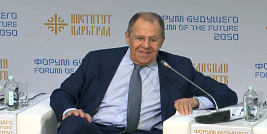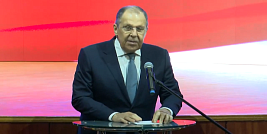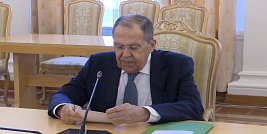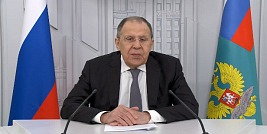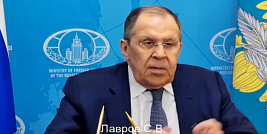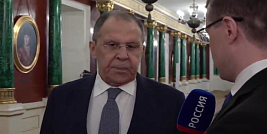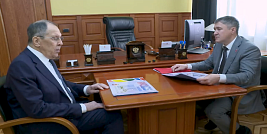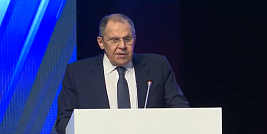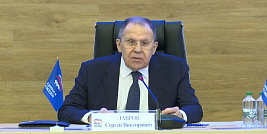Briefing by Foreign Ministry Spokeswoman Maria Zakharova, Moscow, October 1, 2020
Table of contents
- Update on the coronavirus pandemic
- WHO Director-General’s initiative to involve member states in testing COVID-19 vaccines
- Humanitarian assistance to Zambia
- Foreign Minister Sergey Lavrov’s meeting with members of the Association of European Businesses in Russia
- Russia’s Presidency of the UN Security Council in October 2020
- Syria update
- Update on Nagorno-Karabakh
- Appeals by Assistant Secretary of State Christopher Ford to give up cooperation with Russia on nuclear power engineering
- Moving the Alexander Baranov monument in Sitka
- NATO wargames in the Far North
- The Hagia Sophia in Istanbul
- Ukrainian special services to persecute VKontakte social media users in Ukraine
- Kiev’s Sixth Administrative Court of Appeals ruling on the Nazi symbols used by the 14th SS Grenadier Division “Galicia”
- Anniversary of the Munich Betrayal
- Awarding Great Patriotic War veteran Mikhail Podgursky with a Norwegian medal
- Celebration of National Day of the People’s Republic of China
- Celebration of Independence Day in the Federal Republic of Nigeria
- Republic of Guinea marks 62 years of independence
- Kingdom of Lesotho Independence Day
- Talks on extending New START
- US military biological activities in post-Soviet space
- Transfer of mercenaries to the Nagorno-Karabakh conflict zone
- Foreign Ministry statement on Nagorno-Karabakh conflict aggravation
- US Secretary of State Mike Pompeo’s statements made in Greece
- Developments on China‒India border
- Organisation of a pan-Palestinian meeting in Moscow
Update on the coronavirus pandemic
The coronavirus situation is becoming increasingly alarming and shows signs of becoming worse. The number of infected people in the last month alone has increased by 9 million people to a global total of over 33.7 million as of September 30. More than a million people have died since the outbreak of the pandemic.
This surge in the incidence of COVID-19 is happening during the season of exacerbation of acute respiratory viral infections, which greatly increases the risk of them overlapping. This resurgence in the spread of this dangerous pathogen is forcing countries to re-impose lockdowns, albeit locally and for shorter periods than at the outset of the pandemic. However, this will not pass unnoticed by these countries’ economies and social spheres. In fact, the lockdown has already led to major disruptions in industries related to tourism, passenger transport, aircraft manufacturing and many others.
Today’s global challenge can only be overcome through the combined efforts of the international community, which should focus on more than just searching for or developing advanced high-quality diagnostic tools and effective medications. Russia has made strides in developing a safe and reliable vaccine and is willing to start broad cooperation on this with foreign stakeholders.
I said that we should focus on more than merely developing the corresponding medications, and I would like to point out that I’m also talking about interaction in this sphere. It is important to not only engage in scientific research and promote it, but also to stave off unnecessary developments in the international media, specifically, waves of smear campaigns, which, unfortunately, are being used full-throttle to discredit Russia’s efforts in this area. Planted articles are being published and ideas are being generated that the international media promote in order to discourage the international community from obtaining information about our achievements in combating COVID-19 or efforts from Russia, or about Russia. So, in addition to developing medications, it is critical to put a stop to these terrible misinformation campaigns that are designed to discredit these efforts.
WHO Director-General’s initiative to involve member states in testing COVID-19 vaccines
Russia is proactively involved with the WHO on fighting the pandemic by offering financial, institutional support and sharing expertise. In particular, Russian specialists joined Solidarity, an initiative designed to facilitate the exchange of scientific data on COVID-19. It is with great interest that we are reviewing the proposal by the WHO Director-General on a new element of this effort that consists of holding international clinical trials for coronavirus vaccines.
This is a noteworthy initiative, but we need to weigh the legal implications, as well as how it can be implemented at a practical level. Russia’s specialised agencies are currently looking into this matter in order to understand whether we should join it.
Humanitarian assistance to Zambia
On September 21, a Russian humanitarian shipment arrived in Lusaka for assisting the Government of the Republic of Zambia in its efforts to fight the novel coronavirus pandemic.
During an official ceremony, Ambassador of the Russian Federation to Zambia, Alexander Boldyrev, handed over reagent testing kits, for carrying out 5,000 PCR tests, to Zambia’s Minister of Health Chitalu Chilufya.
In his remarks at the ceremony, the Zambian Minister of Health expressed his sincere gratitude to the Government and people of the Russian Federation for their timely support, and noted that this act of solidarity testified to the solid and friendly relations between the two countries.
On October 5, Foreign Minister Sergey Lavrov will meet with members of the Association of European Businesses in Russia (AEB). This association includes more than 500 companies and banks representing EU member states, the European Free Trade Association and a number of other countries operating in Russia. The minister regularly holds meetings in this format (the previous meeting was in February 2019), which have become a good tradition.
In view of the pandemic, this year the meeting will be held in a hybrid format. AEB representatives will gather at the Foreign Ministry in compliance with the restrictions needed for the current epidemiological situation, while others will participate via videoconference.
The agenda includes the current state of and prospects for cooperation between Russia and the European Union in trade and the economy, including against the backdrop of the coronavirus pandemic.
Following the meeting the minister and AEB executives will hold a brief press point.
Russia’s Presidency of the UN Security Council in October 2020
In October 2020, Russia will hold the Presidency of the UN Security Council, the main body of the universal organisation for the maintenance of international peace and security. The Security Council schedule in October will be fairly intensive.
Russia’s Permanent Representative to the United Nations in New York Vasily Nebenzya will describe it in detail today.
I will provide a broad outline for the Security Council’s plans in October. One of the central events will be the ministerial debates on the Persian Gulf situation. The topicality of this issue is determined by the growth of crisis in the region, in part, against the backdrop of Washington’s heavy pressure on Iran and its efforts to undermine the implementation of the Joint Comprehensive Plan of Action (JCPOA) on Iran’s nuclear programme and Security Council Resolution 2231. The goal of the meeting is to discuss in detail ways of building interregional relations based on the principles of mutually beneficial cooperation and reciprocal consideration for each other’s interests. We are convinced that the updated Russian concept on collective security in the Persian Gulf could become a reliable foundation for creating an atmosphere of trust and a genuinely inclusive security system in the region.
Another major event in the Russian Presidency programme is the annual open debate on the topic “Women, Peace and Security.” Symbolically, this is an anniversary year for this – in October it will be 20 years since the adoption of Security Council Resolution 1325. It laid the foundation for the discussion of relevant issues in the Security Council, that have become an area of focus since then. Following the discussion, the participants plan to adopt a document based on agreed-upon approaches to promoting the role of women in the processes of peaceful settlement and peacemaking efforts.
Other important items on the Security Council agenda in October include the monthly discussion of the political and humanitarian aspects of the situation in Syria, developments in Kosovo, Middle East peace process, and events in Yemen and the Golan Heights. The Security Council will also assess progress in an inter-Sudanese settlement, normalisation in the African Great Lakes region, the Democratic Republic of the Congo, the Central African Republic, Mali and Colombia. In addition, the Security Council plans to extend the mandates of the UN Integrated Office in Haiti and the UN Mission for the Referendum in Western Sahara.
As a permanent Security Council member, Russia will do all it can to ensure well-coordinated, constructive and effective work in the interests of establishing a fair and equitable world arrangement based on the UN Charter, as well as the standards and principles of international law.
We noted the intention of the Dutch Foreign Ministry to launch court proceedings against Syria over alleged, serious human rights violations perpetrated by the Syrian authorities. It is hard to believe that the Dutch did not start with Iraq, where the occupation by the US and other countries from the so-called US-led coalition left millions of civilian casualties. There were so many casualties there that no one even bothered to count them. Still, as you can see, it is Syria that the Netherlands decided to act on.
In our opinion, this is definitely a cynical initiative especially considering the recent scandal in the Dutch parliament caused by the publication of leaks in the media showing that the country’s government financed armed groups operating on Syrian territory that the Dutch Public Prosecution Service itself designated as terrorist organisations. The Syrian Foreign Ministry responded to this with a harsh statement. We believe this response to be appropriate. Like Syrians, we believe that by taking destructive steps of this kind, our Western partners undermine international efforts to promote a Syrian settlement.
In this context, I cannot fail to mention the recent visit by the US Secretary of State’s Special Representative for Syria Engagement, Jim Jeffrey, to the northeast of the Syrian Arab Republic. Once again, Washington has clearly trampled on international law, since this high-ranking foreign diplomat visited Syria without the consent of the country’s government. According to the statement released by the US Department of State on this trip, the United States claims that to achieve a peaceful resolution of the Syrian conflict under UN Security Council Resolution 2254 it is working with all Syrians opposed to the Assad regime. This was a visit by an official US representative to a sovereign state. This logic definitely raises eyebrows. After all, this resolution by the international community is designed to facilitate dialogue between the Syrian Government and the opposition, instead of inciting intra-Syrian conflict.
No matter what Jim Jeffrey said during his trip on efforts to preserve Syrian unity, facts point to the actual objectives that the United States is pursuing east of the Euphrates. Let’s look at these facts. Guided by its geopolitical interests, Washington is consistent in its policy to further separate this region with its rich natural resources from the rest of Syria. Our US partners found a sophisticated way to finance Kurdish separatism by exploiting the local hydrocarbon reserves, with US oil companies plundering them as predators under the cover of the US military.
The counterproductive line, adopted by certain external actors, to pit the Syrians against each other affects the Constitutional Committee in Geneva. Having resumed its work in August after a long break, we regret that it had to place its work on pause, after the Syrian delegations failed to agree on the agenda for the next round of talks, which were scheduled by the UN Secretary-General’s Special Envoy for Syria Geir Pedersen to begin on October 5.
There is another important issue. The Foreign Ministry released a statement on it yesterday, when we voiced our concern over reports that fighters from northern Syria are being recruited in great numbers and transferred to the Nagorno-Karabakh conflict zone. The corresponding videos and photos can be seen on social media, along with lists of victims among the mercenaries stating their allegiance to one Syrian anti-government group or another. We view this as further evidence of the fact that territories that have remained outside the control by the legitimate Syrian authorities continue to create threats endangering Syria and beyond.
We are very concerned about the ongoing escalation in the Nagorno-Karabakh conflict that started on September 27. The exchange of weapons fire led to massive destruction of the military and civilian infrastructure and numerous casualties on both sides, including the civilian population. We call on the parties to use restraint and to stop the bloodshed. Our hearts go out to the families and friends of those who were killed or wounded.
Russia enjoys diverse and friendly ties with Azerbaijan and Armenia; Russia is home to numerous Armenian and Azerbaijani communities. We do care about what’s happening in the region.
We firmly believe that a peaceful settlement of the Nagorno-Karabakh conflict is the only way to bring closure to this situation. Resolving regional problems can only be achieved through political and diplomatic efforts.
Russia, acting both as an individual nation and as part of the OSCE Minsk Group, has been making, since the very first hours of hostilities, every effort to achieve an immediate ceasefire and to resume the peace process. President Vladimir Putin discussed the situation with Armenian Prime Minister Nikol Pashinyan over the phone on September 27 and 29. Foreign Minister Sergey Lavrov remains in contact with his Armenian and Azerbaijani counterparts. A telephone conversation with Foreign Minister of Turkey Mevlut Cavusoglu took place as well.
The OSCE Minsk Group co-chairs (Russia, France and the United States) issued a statement condemning the use of force and called on the warring sides to immediately cease hostilities and to resume talks in order to identify a final solution to the conflict. As of now, they continue to make joint efforts aimed at de-escalating the situation.
The situation on the line of contact was discussed by the UN Security Council and the OSCE Permanent Council on September 29, with a special emphasis on the OSCE Minsk Group co-chairs’ central role in the Nagorno-Karabakh settlement.
The bloodshed must be stopped immediately. Against the background of these dramatic events, we consider any bellicose statements or actions by third parties counterproductive and irresponsible. These statements and actions can add fuel to the escalation, destabilise the situation in the South Caucasus and have unpredictable consequences.
We are compelled to reply to statements by Assistant Secretary of State Christopher Ford at Washington’s Nuclear Energy Institute (NEI) in which he allowed himself to make direct accusations against Russian and China of using second-rate nuclear technology as an instrument of political pressure on our partners.
Regrettably, the current US administration continues building walls instead of bridges. This aggressive rhetoric and attempts to label other’s efforts conceal the tiring desire of the US authorities to artificially gain advantage for their companies in the highly competitive nuclear energy market. The analogy with energy, high technology and arms is perfectly obvious in this context.
Moving the Alexander Baranov monument in Sitka
We have closely followed the situation on moving the monument to the first Governor of Alaska and the ruler of Russian lands in North America, Alexander Baranov, from the central square of Sitka to the city’s historical museum. As we noted before, we feel some regret about this decision that was made as part of the US’s large-scale campaign on eliminating monuments and revising national history.
The Sitka city authorities said more than once that the sculpture would be moved “in a respectful and positive manner,” and that museum visitors would have the opportunity to see the exposition devoted to Russian America. According to available information, the monument is now at the museum and a befitting pedestal is being made for it.
We will, of course, have to see that the sculpture is presented properly, without any distortion of his personality and historic mission. We will follow the further developments. When the epidemiological situation subsides, we plan to send an interdepartmental delegation to Alaska to meet with the regional and city authorities and representatives of the public, scientific and museum communities. We hope that as a result we will manage to coordinate mutually acceptable parameters for cooperation on preserving and promoting common cultural and historical heritage.
NATO wargames in the Far North
We note that the holding of the naval wargames by Britain, the US and Norway in cooperation with the Danish Air Force in the Far North in September were a source of serious concern. These exercises were supposed “to support freedom of navigation.” However, we are convinced that these wargames as well as the general buildup of NATO’s military presence in the high latitudes by no means facilitate the strengthening of peace and stability in the Arctic. On the contrary, they only contribute to the escalation of tensions in the region.
Unfortunately, we see that London prefers to focus primarily on the military-political aspects of the Arctic. Thus, in 2018, Britain was the first non-Arctic country to proclaim a national Arctic military strategy. British military personnel regularly take part in NATO exercises in the high latitudes. We believe that if Britain focused not on military buildup but on opportunities for constructive cooperation in the Arctic, it would be a much bigger contribution to the promotion of peace and stability in this region. The joint statement of the foreign ministers of the Arctic Council member states, which was adopted in Rovaniemi, Finland in May 2019, was written with this goal in mind. As a reminder, Britain has only observer status with this forum.
Russia continues to watch closely how the situation around the former Hagia Sophia cathedral and museum being converted into a mosque open for worship is evolving. Recognising Turkish authorities’ sovereign right to this cathedral, we would like to note that managing a UNESCO World Cultural Heritage site means, in the first place, a distinct responsibility for ensuring the integrity of this landmark of Eurasian civilisation.
We believe our Turkish partners will show respect for the feelings of Orthodox Christians from all over the world, who will always see the Hagia Sophia not only as part of world cultural heritage but also as one of the greatest Christian holy places placed under the protection of the international community and the Republic of Turkey. We believe measures being taken by Ankara will allow it to ensure free access to the site for tourists of all faiths, as well as the integrity of the Christian art work located inside the cathedral.
In this connection, we attach special importance to the monitoring mission of experts from the UNESCO World Heritage Centre and the International Council on Monuments and Sites (ICOMOS) to assess the condition of the cathedral. We expect the mission due to visit Istanbul in October to present its analysis and conclusions as soon as possible, providing an unbiased assessment of the condition of the cathedral building and the numerous valuable mosaics and murals of the interior.
Ukrainian special services to persecute VKontakte social media users in Ukraine
We were shocked to hear Secretary of the National Security and Defence Council of Ukraine Alexey Danilov say that the Ukrainian security forces will track down and list the VKontakte social media users, who, he believes, must be held responsible for using the site. So much for freedom and democracy in Ukraine.
As you may be aware, along with other Russian social media and websites such as Odnoklassniki, Mail.ru and Yandex, VKontakte was blocked for three years in Ukraine in 2017 by then President Poroshenko. The hopes that he might have taken Russophobia, total censorship, and fighting dissent with him when he left office have not materialised. In May 2020, President Zelensky, seemingly a modern person and an advanced social media user, extended the sanctions until 2023.
Now, Ukraine’s special services will focus on Ukrainians who believe that access to information is important. This approach is reminiscent of the worst practices of totalitarian regimes, a battle that the Ukrainian authorities are so vocal about. This is about ignoring international human rights, in particular, to the free flow of information and unfettered access to it. By leaps and bounds, Ukraine is headed towards building nothing short of a police state. At the same time, Kiev shamelessly declares its adherence to European values and principles.
We call on international human rights organisations, institutions and Kiev’s Western patrons to break their silence and properly assess the gross human rights violations in Ukraine.
On September 24, the Sixth Court of Appeals in Kiev overturned the ruling of the court of first instance and recognised the symbols of the 14th SS Grenadier Division “Galicia” as legal and as not falling under the description of the symbols of national socialist totalitarian regimes. Thus, according to the Ukrainian court ruling, “Galicia” and other SS units are, in fact, no longer criminal Nazi organisations. Great! So, you block the VKontakte social media site and at the same time declare that Galicia does not fit the description of a national socialist totalitarian regime. That is, using VKontakte is not acceptable, but walking around with the “Galicia” insignia is okay. Someone please ask Mr Zelensky how this is even possible.
As you may be aware, 14th SS Division volunteers were guilty of brutally killing many thousands of civilians and partisans. In particular, they killed more than 500 Polish civilians in the village of Huta Pieniacka, at least 250 Poles in the village of Podkamien, and people from dozens of other towns and villages in Poland and Ukraine. These collaborators were involved in the mass killings of women and children, as was the case in the village of Zabuze. Those criminals took part in killing not just Slovak partisans, but also the Slovak civilians who supported them.
The European countries’ praise of democratic values in Ukraine is puzzling at a time when official Kiev and various Nazi organisations created with its tacit approval, and often direct support, glorify the atrocities of the SS during WWII when they wiped out entire families in Eastern Europe. Importantly, in 2016, the Polish parliament qualified the crimes of the 14th SS Division “Galicia” against the Polish population as genocide.
You can be sarcastic about this, but you still need to adopt a principled position on this matter. We are outraged by the above ruling of the court of appeals. We call on the Kiev authorities to stop whitewashing the atrocities of Nazi criminals, henchmen and collaborators, and finally do something to curb the country’s national radicals’ outrageous behaviour as they continue to openly promote Nazi ideas. We are asking the UN General Assembly and other international agencies to step up their efforts to combat the glorification of Nazism and neo-Nazism.
Anniversary of the Munich Betrayal
On the same subject, and as a reminder (we will regularly discuss this) of our shared past connected with the Second World War, I would like to say a few words about the Munich Betrayal.
There has hardly been a more outrageous precedent in the history of diplomacy of trampling on international law and the universally recognised ethical norms than the conference of the four powers: England, France, Germany and Italy, hastily convened in Munich on September 29 and 30, 1938. This went down as one of the most shameful and tragic pages in history, and it paved the way for the Second World War. There was no meaningful debate, since the conference was meant to formalise a deal that its participants agreed upon in advance. A draft, proposed by Benito Mussolini, who in turn had received it from Berlin, served as a starting point. Representatives from Czechoslovakia, and the USSR who had a mutual assistance treaty with Czechoslovakia, were not invited to the conference. The Czechoslovak delegation arrived in Munich but did not take part in the negotiations, and was just informed about the outcome post factum.
Hungary and Poland bear their share of responsibility for the partition of Czechoslovakia. During the period of the Czechoslovak crisis they adopted a clearly pro-German position, and then made their own claims for Czechoslovak territory.
In essence, the policy to appease Adolf Hitler culminated with the Munich conference as a prelude to the outbreak of WWII. It definitely set the aggressor loose.
An extensive body of research and documents have been published on the Munich Agreement, also known as the Munich Betrayal. The USSR/Russian Foreign Ministry alone published seven collections of documents dealing with that period. Let me mention some of them: The Year of Crisis; Documents on the History of the Munich Betrayal; The USSR in the Struggle for Peace on the Eve of the Second World War; the 21st volume of the USSR Foreign Policy Documents series, and these are just a few titles.
It could seem that everything is abundantly clear. However, we are witnessing attempts to produce false interpretations of what happened during this period that have little in common with searching for objective truth. In a number of publications, authors persist in their efforts to justify the Munich Betrayal, distort the true objectives of its masterminds and diminish its role as one of the key links in a chain of events that led to the outbreak of the Second World War. We view publications of this kind as attempts to undermine the long-held views on the war, twist the main events to one’s benefit and create a new version to suit one’s political agenda in an attempt to go as far as equate the responsibility of the USSR and Nazi Germany for what happened back then.
The policies of specific states in the period between the two world wars may be subject to various interpretations. Still, to most people, the Munich Agreement, whereby England and France, with the backing of the US, gave the green light to Nazi Germany to partition and then invade Czechoslovakia, is clearly synonymous with the policy of betrayal and pandering to the aggressor.
Awarding Great Patriotic War veteran Mikhail Podgursky with a Norwegian medal
We were pleased to note the ceremony to award Great Patriotic War veteran Mikhail Podgursky with Norway’s state medal for the participation in the defence of Norway, which was given to him on behalf of the King of Norway. The ceremony took place at the Norwegian Embassy in Moscow on September 18.
We are grateful to Norway for its considerate approach to our common memory of WWII events related to the liberation by Soviet soldiers and officers of East Finnmark in the course of the Petsamo-Kirkenes Offensive in October of 1944. Of course, our shared history brings together the Russian and Norwegian peoples.
In the year we celebrate the 75th anniversary of the Victory, we are calling on everyone to not forget the horrifying lessons of that tragedy, when, overcoming their disagreements, people from different countries joined forces to achieve one goal – defeat Nazism. It is very important that today people keep the memory of that war in their hearts.
The great Victory is one of the most important events in world history, as well as a spiritual value and a moral guide for many generations.
We wish Mikhail Podgursky good health and longevity!
Celebration of National Day of the People’s Republic of China
On October 1, the Chinese people celebrate their National Day, the 71st anniversary of the founding of the People’s Republic of China (PRC). Having been through serious trials caused by the novel coronavirus infection, China is celebrating its national holiday against the backdrop of impressive socio-economic achievements and the further consolidation of its status in the world arena. We are happy to see the successes of the friendly Chinese people.
The Soviet Union was the first to recognise the birth of the new state and established diplomatic relations with it as early as October 2, 1949. We are pleased to say that our current ties with China are the best in our history. The intensive and trust-based meetings between President of Russia Vladimir Putin and President of China Xi Jinping are the main driving force behind our dynamic bilateral ties. Following the June 2019 Russia-China summit, the participants stated that relations of comprehensive partnership and strategic cooperation were entering a new era.
This year, the two countries celebrate the 75th anniversary of Victory in World War II, during which we were allies in fighting Nazism and militarism. Russia and China firmly counter any attempts to falsify history and revise the outcome of World War II.
We consistently strengthen our ties in the practical areas that meet the long-term interests of our nations. The mechanism for regular prime minister meetings plays a tangible role in promoting our ties.
The new large-scale programme for holding Russia-China years of scientific, technical and innovative cooperation, which was launched this year at the decision of the heads of state, is called on to give fresh impetus to cooperation in science-based and innovation related areas.
Our countries’ approaches to world affairs are identical or very close. As a result, closely coordinating foreign policy efforts and acting in a united front, our countries make a big contribution to the promotion of a constructive agenda at leading multilateral venues, primarily the UN and the Security Council, the SCO, BRICS, the G20, the East Asia Summit and in the Russia-India-China format. They also facilitate a search for effective ways of resolving current global and regional issues.
We jointly support the building of international relations on the principles of mutual respect, justice and mutually beneficial cooperation, the equitable participation of all states in global governance, observance of international law, equal and indivisible security, mutual respect and consideration for everyone’s interests, renunciation of confrontation and conflicts and the creation of a more just and rational polycentric international order.
I would like to sincerely congratulate our Chinese colleagues on their National Day.
Celebration of Independence Day in the Federal Republic of Nigeria
On October 1, the Federal Republic of Nigeria, with which our country traditionally maintains friendly relations, is celebrating the 60th anniversary of its state independence. The Soviet Union established diplomatic relations with Nigeria on November 25, 1960, immediately after its withdrawal from the British protectorate.
The Nigerian people who have a centuries-long history that includes about 300 different religious, linguistic and cultural ethnic groups, demonstrated unity in the face of the British regime and fought together for a long-awaited freedom despite internal differences. Having been through several military coups and the 1967-1970 civil war, the Nigerian state has consistently and dynamically developed, in part, with Soviet support. It traversed an uphill road from an agrarian and raw materials colony to Africa’s biggest economy, an influential member of sub-regional, regional and international organisations and an active participant in the counterterrorism and peacekeeping missions on the continent. During the years of independence, the population of Nigeria has grown from 60 million to over 200 million people.
Today, the authorities of the Federal Republic of Nigeria are generally successful in resolving the tasks of socio-economic development and conduct a well-balanced foreign policy course. We congratulate our partners on their Independence Day and wish them peace, prosperity and wellbeing.
Republic of Guinea marks 62 years of independence
On October 2, the people of Guinea, with whom we share long-standing ties of friendship and cooperation, will mark Independence Day, its national holiday.
Guinea’s path to freedom was not an easy one. Until the early 19th century, European forts located on Guinean territory were actively involved in the slave trade. The local population suffered from severe exploitation. France, Great Britain and Germany competed to control the conquered land, and Paris prevailed. French colonial rule faced fierce resistance from local tribes. On September 28, 1958, Guineans voted in a referendum by a majority of 95.4 percent against joining the French Community. On October 2 of the same year, the Republic of Guinea was proclaimed. Therefore, Guinea was the only French colony whose population spoke out against the Constitution of the Fifth Republic and opted for full independence.
Western “democracies” did not support the proclamation of Guinea’s sovereignty. France severed its economic ties with Conakry, recalled its specialists and imposed sanctions, together with other NATO members. They simply couldn’t help it. The Soviet Union came to the rescue of the young African republic and established diplomatic relations with it on October 4, 1958, and helped this country build its statehood. Our country supported Guinea in major construction, industrial and agricultural projects.
In March 2014, Russia became proactively involved in fighting the Ebola outbreak in Guinea, Liberia and Sierra-Leone. Towards the end, this helped overcome this dangerous disease in West Africa.
Russia continues to lend Guinea its all-round support, including in trade, economic and humanitarian affairs, and personnel training. We have no doubt that Russia and Guinea will continue to expand their time-tested, diversified and mutually beneficial ties.
On the occasion of the country’s national holiday, we wish the friendly people of Guinea every success in achieving sustainable socioeconomic development, peace, well-being and prosperity.
Kingdom of Lesotho Independence Day
On October 4, the Kingdom of Lesotho, with which the Russian Federation shares friendly relations, marks Independence Day, its national holiday.
The Kingdom of Lesotho existed as a British protectorate from 1868 until 1966. On April 30, 1965, the country was granted full autonomy, and it proclaimed independence on October 4, 1966. Established on February 1, 1980, diplomatic relations between our countries are rooted in the principles of friendship and mutual respect.
Russia has consistently supported the Kingdom in education and personnel training, and has been delivering humanitarian aid to Maseru. In 2014, the Russian Emergencies Ministry sent five mobile medical modules and food supplies to Lesotho as part of the UN World Food Programme. In November 2019, Russia supplied four trauma and two surgical modules for carrying out 400 operations, as part of the WHO capacity building project for health emergency preparedness and response, financed by the Russian Federation.
We are satisfied with the consistency of interaction between Russia and Lesotho within the UN General Assembly and on other multilateral platforms. We are committed to further strengthening political, trade, economic, humanitarian and other kinds of cooperation.
Taking this opportunity we would like to congratulate our friends in Lesotho on their national holiday and wish them well-being, stability, peace and prosperity.
Question: US Special Presidential Envoy for Arms Control Marshall Billingslea said in Japan on September 29 that the ball is now in Russia’s court in the New START talks and that the US proposals would benefit both sides. Do you agree with this view? Regarding this, what will Russia do next?
Maria Zakharova: I would like to point out that Russian Ambassador to the United States Anatoly Antonov has provided a detailed comment on the possibility of extending the New START in an interview with a Russia television channel. He said that the treaty represented a balance of interests between the two great powers, did not affect the defence capability of either the United States or Russia and provided a solid basis for normal, predictable and pragmatic bilateral relations. Moreover, any failure to extend the treaty would create a vacuum. We have been working for the past 50 years to create an atmosphere of culture in negotiations between the United States and the Soviet Union/Russia. We have coordinated a huge amount of verification procedures. We have reached a high level of mutual confidence in this sphere. All of this will be destroyed overnight. In short, we have already answered your question. I would like to add that there is a great deal of useful information in Ambassador Antonov’s interview and that we fully support his statements.
Question: My question concerns the continued US military biological activities in the post-Soviet space, in particular Georgia, and the new facts revealed by Bulgarian investigative journalist Dilyana Gaytandzhieva.
It has transpired that the United States is planning to invest $160 million in biological weapons research and to turn Georgia and the notorious Lugar Research Centre into the largest biological research centre in Europe and Central Asia. The documents that have been made public provide grounds to believe that the United States is creating bacteriological (biological) weapons. In light of the novel coronavirus pandemic and the current aggravation between Armenia and Azerbaijan, which hosts similar dual purpose facilities, can it be said that a verification mechanism should be added to the Biological and Toxin Weapons Convention (BTWC)? Could Russia put forth this initiative in the interests of global biological security?
Maria Zakharova: We comment on this matter whenever we get new facts regarding it. You are citing an investigation on which we have already commented. Detailed information regarding this matter is available on our website. We will certainly analyse any new facts, data and information as soon as we receive them. At this moment, I can tell you that we have announced our position regarding the so-called military biological laboratories in the post-Soviet space more than once. We are deeply concerned about the US activities in this sphere. Frankly speaking, we do not expect them to make any breakthroughs in this research. But we believe that the international community must closely monitor these activities.
Question: Yesterday, the Foreign Ministry voiced concern over the redeployment of mercenary militants from the Middle East to the Nagorno-Karabakh conflict zone. Did this information come from the media, statements by the leaders of Azerbaijan and Armenia, or do Russian security services have their own authentic information?
Maria Zakharova: We have this information. This is what we know. This information is available, and it was submitted to the media as materials from social media and the relevant publications. But when we issued our comment on October 1, which was posted on the Foreign Ministry’s website, we certainly had our own facts and information.
Question: Your statement has the following phrase: “An appeal to the leaders of the concerned states.” However, you did not mention these states.
Maria Zakharova: No, we are not only talking about Russia’s position, and today I did not mention only Azerbaijan and Armenia. You may have noticed that I also mentioned the OSCE’s Minsk Group and its co-chairs. There are also some states which are either concerned or which consider it possible, necessary and important to make statements on this score and to exert certain efforts. There are many such states. Apart from separate countries, there are international organisations that bring together various states. Consequently, our appeal is addressed to everyone. Today, I mentioned the relevant states.
Before that, I noted that Foreign Minister Sergey Lavrov had telephone conversations with his Turkish counterpart. Therefore, Turkey was also mentioned.
Question: My question was more specific. I asked a question about the redeployment of terrorists and militants. You did not specify who is redeploying them and how.
Maria Zakharova: On the whole, this comment underscores our concern over these facts. I would rather not go into details at this stage.
Question: During his visit to Greece, US Secretary of State Mike Pompeo accused Russia of destabilising the region, especially Libya, and said that it was spreading misinformation about the pandemic and trying to control the Orthodox Church. Mike Pompeo also noted that he agreed to foster closer cooperation with Greece in order to overcome the negative Russian influence. How can you comment on these statements and possible new agreements with Greece on strengthening the US military presence?
Maria Zakharova: We don’t see the US position as something new. To what extent does this approach meet the interests of Athens? This is a good question, and one should address it to Greek leaders. We are concerned about Washington’s plans to expand its military presence in the eastern Mediterranean region because they are openly directed against Russia. No one conceals this fact. These plans reflect the aggressive US policy and they certainly do not help strengthen peace and security in this region.
The energy sector was also discussed there in detail. We have never claimed the right to monopolise supplies, and we have never played the role being ascribed to us. We emphatically oppose the politicisation of cooperation in this sphere. Consumer countries alone should make their own choice under the logic of free competition, economic expediency and profitability.
Question (retranslated from English): Could you comment please on the current situation in the Ladakh area on the Chinese-Indian border?
Maria Zakharova: We continue to monitor the state of affairs on the Chinese-Indian Line of Actual Control. We welcome the de-escalation agreements reached by the foreign ministers of China and India during their talks held in Moscow on September 10. We respect the sides’ desire to act independently in this matter within the framework of the multi-level mechanisms for bilateral dialogue they have formed and to avoid any interference from outside forces. We hope that both states as responsible members of the international community will be able to find mutually acceptable peaceful ways to settle the tension as soon as possible.
Question: On August 26, Special Presidential Representative for the Middle East and Africa and Deputy Foreign Minister Mikhail Bogdanov had a telephone conversation with member of the Politburo of the Democratic Front for the Liberation of Palestine (DFLP) Qais Abd al-Karim (Abu Layla). The officials discussed the situation emerging in the context of a Palestinian-Israeli settlement. The DFLP leader welcomed the proposal to organise another all-Palestinian meeting in Moscow. Have they agreed upon any dates for an intra-Palestinian meeting in Moscow? What Palestinian factions is Moscow contacting on this matter?
Maria Zakharova: We are confident that the restoration of Palestinian unity on the political platform of the Palestine Liberation Organisation (PLO) is an important prerequisite to arranging direct, constructive Palestinian-Israeli talks. In this connection, we welcome and support the timely unifying steps undertaken by the leading Palestinian political organisations and movements, including the September 3 teleconference that President of the State of Palestine Mahmoud Abbas held with the heads of 14 main Palestinian factions, as well as talks between representatives of FATAH and HAMAS held in Istanbul and Doha just the other day.
For our part, we confirm Russia’s principled readiness to consolidate the positive trend emerging ahead of the planned Palestinian meeting in Moscow. We are maintaining relevant contacts with the Palestinian leadership headed by Mr Mahmoud Abbas as well as with all the leading political forces. The leaders of FATAH, HAMAS and other Palestinian parties and movements have expressed an interest in attending the event.
Regrettably, it is still premature to speak about the specific timeframes for the unification forum in Moscow on account of the persisting sanitary and epidemiological restrictions. We intend to organise it as soon as the situation gets back to normal.

